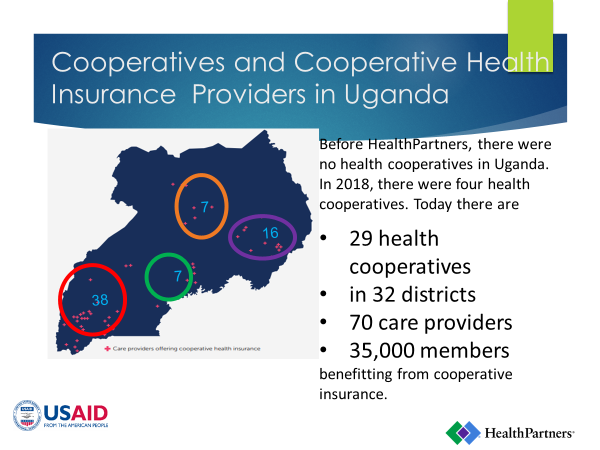Impact of Cooperative Health Insurance
Strengthen cooperatives in governance, leadership and management
Support the cooperatives to register and comply with MoTIC requirements.
Provide technical assistance to health cooperative boards to competently fill their roles and responsibilities.
Empower members to hold boards accountable and demand for quality services.
Improve data and research platforms among cooperatives collaboratively shared
Data use, collection and reporting for decision making and guide project management.
Develop and implement learning agenda, research and publications on cooperative health.
Cooperative market performance
Increase the number of cooperative health providers offering quality health care benefits.
Provide technical assistance to the health providers to use data to inform cost pricing.
Increase provider cost recovery or surplus.
Increase value of services.
Registered cooperatives revenue exceeds expense increase.
Cooperative members services
Provide technical assistance to the cooperatives to increase health cooperative insurance membership, member equity and health cooperative benefits.
Equity, Diversity and inclusion in cooperatives strengthened
Advocacy Leadership forums for women and youth to enhance cooperative health in Uganda.
Increase access to services and resources for women.
Integrate gender and social inclusion into cooperative health.
Legal and regulatory framework to achieve Universal Health Care
Policy dialogue engagement with MOH on NHIS.
Work with stakeholders to create an enabling environment for NHIS.
Increased access to and adoption of cooperative tools and approaches
Cooperative insurance management tools.
Cooperative data informed decisions by health cooperative boards and health providers.
Research sharing porthole.
Innovations, experiences and learnings shared
Guide and support learning exchange site visits.
Lead conferences and panel discussions on cooperative health.
Leading, and facilitating round table meetings and discussions using the 4RR approach.

The cooperative model protects members against high out-of-pocket health expenditures, increases cost recovery for healthcare providers, and promotes sustainability in terms of access to quality and affordable health care.
Evidence has consistently shown that health cooperative members are less likely than non-members to fall into debt, pay for health care on credit, or sell off their assets to access health care.
Health cooperatives contribute to economic stability and strengthen health systems by driving improved quality and empowering women to have a say/ voice in access and coverage of health care that is responsive and accountable to member needs.
The health care providers sign agreements with health cooperatives who prepay premiums that enable members to seek care when they need it. Healthy members offset the cost of care for those who fall sick. The model incentivizes health care providers who earn a surplus to keep medicines in stock and pay staff on time and reinvest the surplus to improve quality of care to members.
